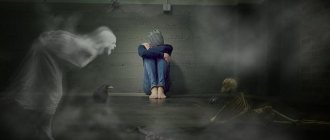Depression is a pathological mental state characterized by the presence in the patient of the so-called “depressive triad”:
- loss of mood and ability to enjoy current events;
- thinking disorders accompanied by a pessimistic, negative outlook on what is happening in life;
- motor retardation.
Outwardly, the state of depression looks like complete apathy to what is happening. At the same time, the patient himself resembles a “human robot”, without proper self-esteem, unable to think positively and automatically performing habitual actions. Often, a person susceptible to depression may become addicted to alcohol, narcotic or psychotropic substance abuse.
Today, depression is recognized as the most common pathological mental state. According to WHO, it affects 5% of children and adolescents, every 10 adult patients and every third elderly person over the age of 65 years.
Types of depression and reasons for their development
The appearance of various types of depression can be triggered by the influence of external or internal factors.
- Reactive depression - the cause of development can be a person’s previous very strong dramatic experiences, for example, the death of a loved one, a break in a relationship with a partner, divorce, loss of a job, bankruptcy, violent acts against a patient, etc. In this case, the pathology of the mental state arises as a person’s reaction to the shock he has suffered.
- Neurotic depression - a condition that can be triggered by frequent stress, psycho-emotional stress caused by overwork at work or an unfavorable family environment.
- Somatogenic depression - the causes of pathology can be previous serious illnesses, chronic illnesses and pathologies of the body. For example, traumatic brain injury, Alzheimer's disease, diseases of the thyroid gland, female reproductive organs, arthritis, bronchial asthma, etc.
- Endogenous depression is a consequence of the innate characteristics of the human psyche, which are characterized by frequent, causeless changes in mood.
- Pharmacogenic depression – occurs due to long-term use of medications, such as corticosteroids, levodopa or corticosteroids.
Often, a depressed state of mind is preceded by a long period of heavy drinking, dependence on sedatives, sleeping pills or psychostimulants.
Limitations of psychological methods when working with depressed patients
Now there is an opinion that a psychologist can solve many problems and depression is one of them.
In some cases, this specialist is indeed able to provide assistance. This applies to emotional and mood disorders.
The main psychological methods of influencing the patient are conversation, the use of special methods of psychocorrection, conducting tests, trainings, consultations, etc.
For diseases of the nervous system, severe reactions to various situations, or seasonal depression, these methods can be of good help. However, such a specialist does not have the right to carry out drug treatment.
Signs of Depression
According to the ICD (International Classification of Diseases), all symptoms of pathology can be divided into main and additional signs of depression. The main signs of depression include the following conditions.
- The patient's bad mood, which does not go away for 2 or more weeks.
- Loss of interest in life and events occurring in it.
- Stable loss of strength.
Additional symptoms of depression include the following:
- Sleep disorders.
- Pessimistic attitude of the patient.
- Low self-esteem.
- Unreasonable feelings of fear, anxiety or guilt.
- Decreased attention.
- Decreased ability to make quick or responsible decisions.
- Sudden fluctuations in weight.
- Lack of appetite or, on the contrary, excessive unreasonable hunger.
- Unreasonable appearance of a sweet taste in the mouth.
- Obsessive thoughts about suicide or death in general.
If we are talking about the development of depression in a child, then parents should pay attention to the presence of the following signs.
- Loss of appetite.
- Presence of nightmares.
- Negative changes in the child’s character traits, for example, the appearance of aggressiveness, isolation.
- Lack of interest in studying or going to school.
Moreover, to make an accurate diagnosis, the patient, both an adult and a child, must have two or all three main signs and at least three additional symptoms. And the degree of their severity indicates the severity of the pathological state of the psyche.
What is the essence of cognitive behavioral psychotherapy?
Cognitive behavioral therapy is a method of teaching people to change behavior by systematically introducing new positive habits. When using this method of treating depression, the effectiveness of therapy by cognitive behavioral psychotherapists is not in doubt, and is currently the “gold standard” of psychotherapy.
With its help, rational emotional support is provided, the brain is trained, and gets used to new forms of behavior. Talk therapy sessions with a psychotherapist are conducted both in counseling centers and in hospitals and private clinics, as well as online.
Regardless of the location of the sessions, a good psychologist or psychotherapist will take care of a comfortable and safe environment where you can relax and begin to solve accumulated problems and take the first steps to help you get rid of psychological trauma.
If you decide to resort to CP therapy, you will have a chance to learn how to manage symptoms of depression, anger and other destructive feelings. And your treating psychologist will do everything possible to provide the appropriate conditions so that you can truly open up.
Participation in cognitive behavioral psychotherapy is possible either individually or as part of a group with other people. At the same time, certified psychologists working in other areas are allowed to attend sessions.
The benefit of cognitive behavioral therapy is relief from depression and stress.
Anxiety and depression. Often people don't see the difference between these terms. In fact, these are different conditions, but they have something in common - a self-destructive nature.
The consequence of an anxiety disorder is the appearance of restless thoughts, most often illogical. Anxiety disorder is fueled from within, which makes this condition difficult to overcome.
Depression is accompanied by negative thoughts, which only contribute to a worsening state of mind. Depression aggravates the existing disorder, so it is especially difficult for a person during this period.
CP therapy helps get rid of depression and stress: most often the client’s complaints combine both.
The principle of action and treatment is as follows:
With depression, a person rejects or drives away bad thoughts associated with anxiety and depression, this helps to strengthen them, since without recognizing the problem, there is little that can be done about it.
Cognitive behavioral therapy helps to understand and eliminate the side effects of depression, such as intrusive anxious thoughts and insomnia.
Constant practice is the key to success, step by step new positive patterns will become part of your thinking. Depression and other mental health symptoms will no longer have a chance to exist.
Any specialist with a diploma of higher psychological education can practice CBT after appropriate requalification. A psychiatrist can also do this, with only one difference: a psychiatrist can make a diagnosis and prescribe medications, whereas a psychologist does not have such competence. Later in the article we will talk in more detail about the differences between a psychologist and a psychiatrist when treating depression and will help resolve the question of how psychologists and psychiatrists treat depression and where to turn for help.
Check if you have depression
"Beck Depression Test"
Professionals who treat depression
It is possible to provide the necessary assistance to the patient only after the main cause of depression, its type and the severity of the pathological process have been clarified. In each specific case, an individual patient treatment program will be developed.
- For reactive depression, a visit to a psychotherapist or psychologist will be recommended.
- For neurotic symptoms, visit a psychotherapist and psychologist.
- In case of somatogenic depression, it is necessary to visit a therapist, a specialized specialist who treats the disease that led to depression, and a course of psychotherapy.
- Endogenous pathology - treatment by a psychiatrist and a course of psychotherapy are provided.
- Pharmacogenic pathology can go away on its own after discontinuation of the medications that caused the depressed state of mind.
If the patient has been identified as dependent on sedatives, sleeping pills, psychostimulants or alcohol, then he will be recommended to be examined by a therapist, treated by a narcologist and a course of psychotherapy.
Treatment of pathology cannot be carried out independently using antidepressants. Prescription and dosage of medications should only be carried out by specialized specialists. Otherwise, uncontrolled medication use can cause a sharp deterioration in the patient’s condition, increase signs of depression and the degree of suicidal manifestations.
Consultations with a doctor online Taking care of your health is a life priority for everyone.
Communicate with doctors online and receive qualified assistance without leaving your home. Try it Please note! The information on this page is provided for informational purposes only. To prescribe treatment, you must consult a doctor.
Cases from practice
Elena Mikhailovna helps patients even in the most difficult cases, when depression is combined with another pathology.
Patient D. (70 years old). The patient came to the clinic with complaints of a forced persistent tilt of the body to the left, pain in the back, decreased mood, anxiety, sleep disturbances, memory impairment, attention, and fatigue. The doctor made a diagnosis, including depressive disorder with cognitive impairment. After a course of treatment in our hospital (antidepressant and botulinum therapy), within a month the patient’s mood improved, he began to sleep well, the back pain stopped bothering him and his body position improved.
Patient L (51 years old). A top manager of a large company contacted the Clinical Hospital on Yauza. Reason for treatment: tearfulness, anxiety, mood swings, irritability, nervousness, sleep disturbances, twitching in the right infraorbital region. Treatment in other clinics did not bring results. Elena Mikhailovna diagnosed, among others, anxiety-depressive disorder with mild cognitive impairment. As a result of taking the selected medications, all symptoms disappeared, the patient gained self-confidence and completely restored her ability to work.
Do not be left alone with the disease, contact specialists. You can find a way out of any situation. Doctors at the Clinical Hospital on Yauza will help you regain your good mood, vigor and faith in your strength!
Where to go?
— At one time, you advocated for the creation of psychotherapeutic rooms on the basis of district clinics. Have these offices been created?
— In a number of regions, yes. And where they really work, doctors manage to achieve high results. Experience shows: when therapists, cardiologists, pulmonologists, gastroenterologists work together with psychiatrists and psychotherapists, the effect of treating patients with a therapeutic profile is much higher. But it is too early to talk about radical reform in this area. This is a task that requires serious administrative and organizational decisions, financial costs, and changes in the training system for general practitioners.
—Where should a person suffering from depression turn?
— To a neuropsychiatric dispensary, where everyone should be provided with free professional help and prescribed the necessary therapy.
- What is it?
— One of the main means of treating depression is still antidepressants - drugs that equalize the ratio of neurotransmitters: serotonin, norepinephrine, dopamine - the main regulators of our mood, sleep and appetite. In the treatment of depression, it is sometimes impossible to do without sedatives, hypnotics and other drugs.
Mood pills. What are the effects of taking medications for depression? More details
Depressive episode and its dangers
In this state, a number of patients have an irresistible desire to commit suicide. Severe depression can lead to suicide. An inexplicable feeling of anxiety or melancholy pushes people between the ages of fifteen and twenty-five to take rash, spontaneous actions. This is the most dangerous period of life, when a lack of worldly wisdom can push you to a terrible point. Every day, about fifteen people die attempting suicide. Experts say that depression most often leads people to suicide. If you are plagued by feelings of anxiety, joylessness, or depression of an inexplicable nature, do not delay visiting a specialist.









